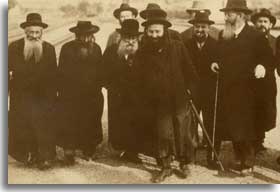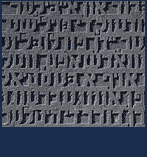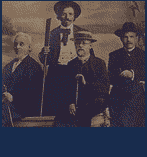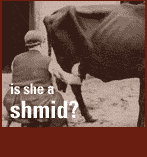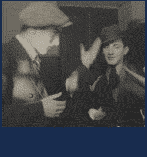

C. Agudas Yisroel
Agudas Yisroel was the political organization that sought to preserve Orthodox religious life while it adhered strictly to Jewish law. The founders of the movement, many of who had abandoned the Mizrachi  movement when the World Zionist Organization agreed to include secular activities among those they sponsored, first met in Katowice, Poland in May of 1912. Agudas Yisroel had several branches, with a women's movement, a labor movement, and the vitally important youth movement. Like other political organizations at the time, Agudas Yisroel established its own schools yeshiva for boys and Beis Yakov for girls, which were religious schools.
movement when the World Zionist Organization agreed to include secular activities among those they sponsored, first met in Katowice, Poland in May of 1912. Agudas Yisroel had several branches, with a women's movement, a labor movement, and the vitally important youth movement. Like other political organizations at the time, Agudas Yisroel established its own schools yeshiva for boys and Beis Yakov for girls, which were religious schools.
Although many members of Agudas Yisroel had formed the organization as a partial response against secular culture, including the secular Jewish political parties such as the Bund and Zionists; the step of becoming officially politically active was also a response to the secular influences they confronted daily. Once active, Agudas Yisroel became involved in local politics with fervor: in Poland in 1919, for example, it gained several seats in the Polish parliament. All along, the members of Agudas Yisroel were staunchly traditional, and included numerous important rabbis and Hassidic leaders.
D. Folkspartei
Started in Russia by Simon Dubnow  , the Folkspartei advocated autonomism
, the Folkspartei advocated autonomism  , a non-Zionist ideology, which postulated that the future viability of Jewish life in Eastern Europe was possible as long as Jews were able to maintain self-rule in community organizations; to sustain its educational and mutual-assistance institutions; and to develop its "spiritual nationhood." It stressed Jewish culture and education, and was largely a middle class party of intellectuals, artisans and the petit bourgeois. Although it rejected socialist principles, the Folkspartei did occasionally band together with the Bund to promote Yiddish culture. Overall a conservative party, it did not compete with the more radical parties, such as the Bund and Zionists, which offered extreme solutions to the worsening situation of the Jews of Eastern Europe. Some Folkspartei leaders, however, grew in stature, becoming distinguished and influential historians, intellectuals, and national figures, while gaining the respect of a wide spectrum of the Jewish community.
, a non-Zionist ideology, which postulated that the future viability of Jewish life in Eastern Europe was possible as long as Jews were able to maintain self-rule in community organizations; to sustain its educational and mutual-assistance institutions; and to develop its "spiritual nationhood." It stressed Jewish culture and education, and was largely a middle class party of intellectuals, artisans and the petit bourgeois. Although it rejected socialist principles, the Folkspartei did occasionally band together with the Bund to promote Yiddish culture. Overall a conservative party, it did not compete with the more radical parties, such as the Bund and Zionists, which offered extreme solutions to the worsening situation of the Jews of Eastern Europe. Some Folkspartei leaders, however, grew in stature, becoming distinguished and influential historians, intellectuals, and national figures, while gaining the respect of a wide spectrum of the Jewish community.
The Reaction to Jewish Political Parties
In the midst of all this struggle and change, a number of non-Jewish nationalist parties in Eastern and Central Europe developed political platforms that were anti-Jewish in character. In the 1930s, as many Eastern European governments turned toward fascism, anti-Semitic sentiments and legislation began to be promulgated in Eastern European countries. In this vein, a number of nationalist political parties believed strongly that Jews should emigrate to Palestine. Although this would appear to have supported the Zionist cause, nationalist groups such as Endecja in Poland employed dangerous tactics to promote this concept, which included staging pogroms against Jews. They claimed that the only remedy for Polish violence against Jews was Jewish emigration from Poland.









